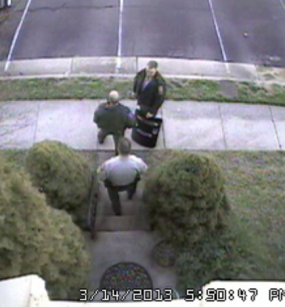On March 14, 2013 our humble home in Annandale, Va. was “swatted” — that is to say, surrounded by a heavily-armed police force that was responding to fraudulent reports of a hostage situation at our residence. Later this month the government will sentence 21-year-old hacker named Mir Islam for that stunt and for leading a criminal conspiracy allegedly engaged in a pattern of swatting, identity theft and wire fraud.

Mir Islam
Mir Islam briefly rose to Internet infamy as one of the core members of UGNazi, an online mischief-making group that claimed credit for hacking and attacking a number of high-profile Web sites.
On June 25, 2012, Islam and nearly two-dozen others were caught up in an FBI dragnet dubbed Operation Card Shop. The government accused Islam of being a founding member of carders[dot]org — a credit card fraud forum — trafficking in stolen credit card information, and possessing information for more than 50,000 credit cards.
Most importantly for the government, however, Islam was active on CarderProfit, a carding forum created and run by FBI agents.
Islam ultimately pleaded guilty to aggravated identity theft and conspiracy to commit computer hacking, among other offenses tied to his activities on CarderProfit. In March 2016 a judge for the Southern District of New York sentenced (PDF) Islam to just one day in jail, a $500 fine, and three years of probation.
Not long after Islam’s plea in New York, I heard from the U.S. Justice Department. The DOJ told me that I was one of several swatting victims of Mir Islam, who was awaiting sentencing after pleading guilty of leading a cybercrime conspiracy. Although that case remains sealed — i.e. there are no documents available to the press or the public about the case — the government granted a waiver that allows the Justice Department to contact victims of the accused and to provide them with an opportunity to attend Islam’s sentencing hearing — and even to address the court.
Corbin Weiss, an assistant US attorney and a cybercrime coordinator with the Department of Justice, said Islam pleaded guilty to one count of conspiracy, and that the objects of that conspiracy were seven:
-identity theft;
-misuse of access devices;
-misuse of Social Security numbers;
-computer fraud;
-wire fraud;
-attempts to interfere with federal officials;
-interstate transmission of threats.
Weiss said my 2013 blog post about my swatting incident — The World Has No Room for Cowards — was part of the government’s “statement of offense” or argument before the court as to why a given suspect should be arrested and charged with a violation of law.
“Your swatting is definitely one of the incidents specifically brought to the attention of the court in this case,” Weiss said. “In part because we didn’t have that many swat victims who were able to describe to us the entire process of their victimization. Your particular swat doesn’t fit neatly within any of those charges, but it was part of the conspiracy to engage in swats and some of the swats are covered by those charges.”

Fairfax County Police outside my home on 3/14/13
Weiss said while the Justice Department prosecutors couldn’t stop me from writing about the case before Islam’s sentencing (and the subsequent unsealing of the case), the government would almost certainly prefer it that way. I thanked him and said while I might be a victim this case, I’m a journalist first.
I’m gratified to see the wheels of justice turning, and that swatting is being creatively addressed with federal felony charges in the absence of a federal anti-swatting law.
The Interstate Swatting Hoax Act of 2015, introduced by Rep. Katherine Clark (D-Mass.) and Rep. Patrick Meehan (R-PA), was passed by the House Energy & Commerce Committee in April 2016. It would impose up to a 20-year prison sentence and heavy fines for swatting. According to the FBI, swatting incidents cost local first responders $10,000 on average and divert important services away from real emergencies.
The Swatting Hoax Act targets what proponents call a loophole in current law. “While federal law prohibits using the telecommunications system to falsely report a bomb threat hoax or terrorist attack, falsely reporting other emergency situations is not currently prohibited,” reads a statement by the House co-sponsors.
To address this shortcoming, the bill “would close this loophole by prohibiting the use of the internet telecommunications system to knowingly transmit false information with the intent to cause an emergency law enforcement response.”
Explicitly making swatting a federal crime is a good first step, but unfortunately a great many people launching swatting attacks are minors, and the federal law enforcement system is simply not built to handle minors (with few exceptions).
By way of example, one of Islam/Josh the God’s best buddies — a then-16-year-old hacker named Cosmo the God — also was involved in my swatting as well as the CarderProfit sting. But it’s unclear whether he is tied to the Islam conspiracy. The DOJ’s Weiss said he couldn’t talk about any others associated with the case who were minors.
“Other individuals who may have been involved were juveniles when they committed the offenses, and those [cases] are going to remain under seal,” he said. “Victims have far fewer rights with respect to juveniles.”
Mir Islam is slated to be sentenced in Washington, D.C. on June 22. Weiss said the judge presiding over the case can sentence him to a maximum of five years in prison.
This summer promises to be a good one for closure. Sergey Vovnenko, another convicted cybercriminal who sought to cause trouble for this author (by trying to frame me for heroin possession) is slated to be sentenced in New Jersey in August on unrelated cybercrime charges.




Brian,
I, too, was swatted several times. One of the incidents was rather extreme and several federal law enforcement agencies were immediately involved. Eventually, a person was arrested and a court case is pending.
Swatting can, in effect, be attempted murder. It can also be terrorism. Swatting is not a prank.
Not every swatting incident is targeted at a person’s home. Some are targeted at very public locations. This particular swatting incident against me endangered over 100,000 people and caused the involvement of many emergency response agencies.
My advice to anyone who is being harassed online and having crimes committed against them is to make reports to the police, as well as to the FBI and any other agencies.
Brian, like you, I have had a huge number and huge variety of cybercrimes committed against me. I have had the whole Who’s Who of internet criminals attack me in ways such as Twitter harassment, cyberstalking, posting personal information, defamation, photoshopping to create obscenity, posting my name and lies about me on obscene sickening websites, purchasing domains in my name to create smear websites, joining sex sites in my name, hacking, theft, identity theft, credit theft, filing a false restraining order case against me to try to intimidate me as a witness in a hacking case related to terrorism, swatting, and on and on and on.
It has helped me tremendously to have reports in to the various agencies in different cities. My reports have also helped the police and FBI know what is going on and who is doing what.
Patience is key. It can take years for a swatter to be caught and more years for a trial or plea.
As a long time victim of cybercrime, I don’t like to talk or write much about the effect it has had on me. However, I have written some about it and have named names of some of the perpetrators and their groups. I have been told that writing or speaking about it attracts more cybercrime, since people engaged in such acts are bullies and want to cause increased suffering. But I think writing and speaking about cybercrime is important, if only so that new young user of the internet will be less likely to be drawn in by the hate and crime groups that now so permeate the internet.
Mr. Jardin
Eloquent expression of these crimes against you, and thank you for expressing it for all to see.
Brian, am glad the wheels of justice have finally ground out something for Islam’s blatant attack on a free press, as well as for you.
Anyone remember Lori Drew from 2007?
Another form of cyber terrorism, resulting in a teenage girl’s suicide.
Place Lori’s name into a search engine for the 2007-08 details/reminders.
Does it get your juices flowing again?
Glad to read a swatting bill has finally passed a US House Committee, but as proven by Lori, it needs state law back-up for the local electronic terror, and too few states have responded to 10 years of this crap.
On that needed House bill for the inter-state, and trans-national border crap, I remind that as of today, due to our archaic, sclerotic 1787 Constitution, there are only 40 legislative days remaining in this Session. To get it through both House and Senate will take a concerted grassroots effort.
For the readers who get outraged reading what damage Islam and Drew have done, how about channeling some of that good ire to your Congressional delegation, with a CC to your state legislature reps, demanding action.
Good luck to us all.
The US house and senate set their own calendars. If you want to be angry at congress for not being in session long enough to get anything done, the people to blame are members of congress. Vote the clowns out of office who think that compromise is impossible.
Brian,
He who laughs last, laughs best.
P.S. Hummm… food for thought:
https://en.wikipedia.org/wiki/Trial_as_an_adult
The fbi/cia/police are on a roll- a global crime spree unprecedented in human affairs.
http://portland.indymedia.org/en/2016/06/432445.shtml
http://www.indymedia.org.nz/articles/6051
While I do not condone the underlying behavior it’s nice to see (sarcasm) Congress going crazy again with a 20 year sentence for the crime. As if the nation is not already full to the gill’s with criminals in its jails.
So let me ask Brian a direct question: having been a victim of this crime do you think a 20 year sentence would be an appropriate sentence for what was done to you? If so, why? If not, why not?
Curious, did you in fact read the legislation? The 20 year sentence is if the swatting incident results in serious bodily injury. And if a death results, the sentence could be life in prison.
If an emergency response takes place, but there are no injuries, the maximum is 5 years. And if there’s no actual response, the maximum is one year.
It pays to actually read the legislation which you are criticizing.
Oh Mr. ISLAM is going to the slammer, thats fantastic, one less mudslime on the street, and he will get much more than those 72 virgin they are promised, but they will be all men banging Mr. Islam butthole. Fantastic.
You’re doing my hometown proud, Brian! Keep up the great work!!